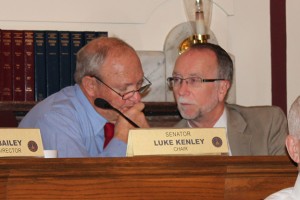Which Education Initiatives Can Indiana Afford This Session?
One of the first items on the agenda when the General Assembly returns next week is crafting a biennial budget.

Sen. Luke Kenley, R-Noblesville, (left) looks over budget documents from the Department of Education. (Photo Credit: Rachel Morello/StateImpact Indiana)
Legislative leaders have pledged to balance the budget this session without any tax increases – which could prove challenging, since requests submitted by several state agencies would require extra spending.
According to a revenue forecast released last week, Indiana’s overall fiscal picture in the next budget cycle looks promising. Indiana Public Broadcasting’s Brandon Smith reported on the numbers:
State leaders say they’re cautiously optimistic about Indiana’s fiscal future after the new revenue forecast predicted a 2 percent to 3 percent growth in the next budget cycle.
Two percent to 3 percent revenue growth in the next budget would mean more than $800 million over the next two years.
What does this forecast mean for education?
Governor Mike Pence laid out a handful of proposals earlier this month for his legislative agenda, noting he wants the 2015 session of the Indiana General Assembly to be an “education session.” His ideas include:
- A continued push for pre-k – $10 million per year for the next two years to fund scholarships for the On My Way Pre-K pilot program,
- Altering the K-12 school funding formula to increase base funding per pupil,
- Paying teachers more through “performance bonuses,”
- Expanding the performance-based funding model for state colleges and universities,
- Increased investment in career & technical education at the high school level, and
- Removing the dollar cap on school voucher “Choice Scholarships.”
“We all know that changing K-12 education is difficult,” Pence said at a legislative conference earlier this month. “Investing in our teachers and students will pay dividends for generations. The future of today’s students and the American economy depends on it.”
Senate Appropriations Chair Luke Kenley, R-Noblesville, calls the proposed initiatives ‘ambitious,’ and says they will have to be prioritized.
“I don’t think that this revenue forecast will sustain all of those initiatives at the levels that they may be requesting,” Kenley says. “It’s going to test the legislature’s ability to be disciplined and keep Indiana financially strong to come up with the right answers and still meet the priorities that we all want to serve if we can.”
Kenley says school funding will be a high priority. Along with Gov. Pence, House Republicans emphasized the item in their own 2015 agenda – specifically, increasing base funding for K-12 education, and adjusting the school funding formula to address broad disparities in per-pupil funding at schools statewide.
Kenley says he thinks the projected budget growth is enough to increase base funding.
“The focus on school funding reflects the right priority,” Kenley says. “I think we’ll figure out a way to get that done.”
The legislature will also attempt to equalize the funding formula to eliminate imbalance. House Speaker Brian Bosma, R-Indianapolis, told The Indianapolis Star in October that the current funding formula creates a disparity of up to $4,000 per pupil that hits suburban and rural school districts the hardest.
Kenley says figuring out logistics will take some time, and the end result may not satisfy all involved.
“You’ve got a lot of people in the pie right now, and its not such a robust forecast that you can just satisfy all comers,” Kenley says. “[But] I don’t think anybody’s out to use the political strength to help some students at the expense of other students. It’s really a measure of what does it take to take care of the difference of the difficulty in educating people from different types of demographics.”
The 2015 legislative session begins January 6.
